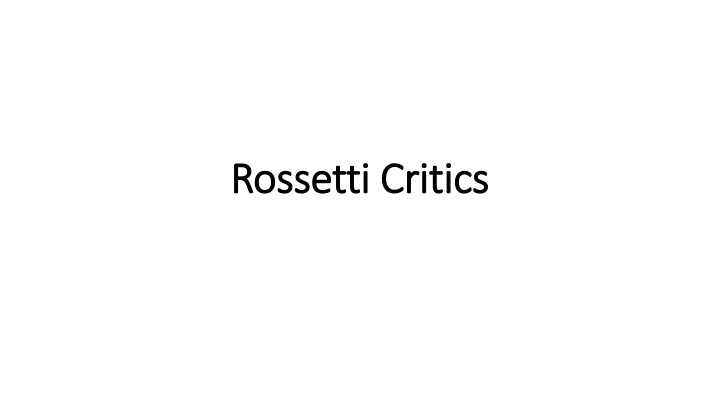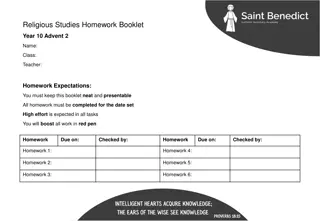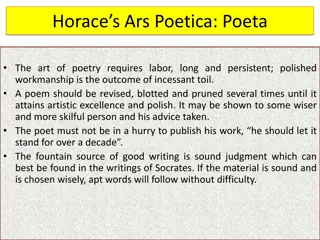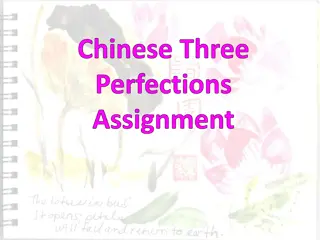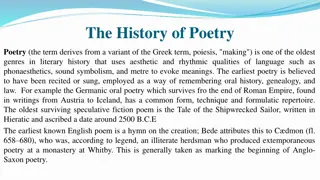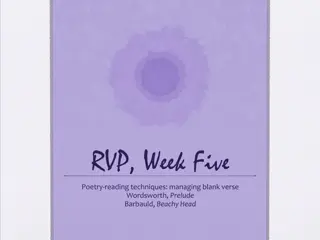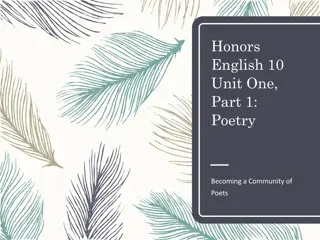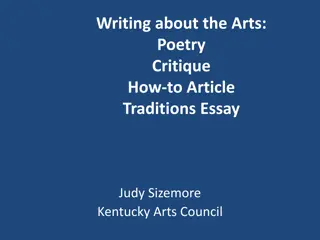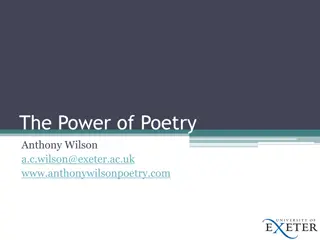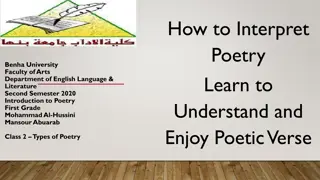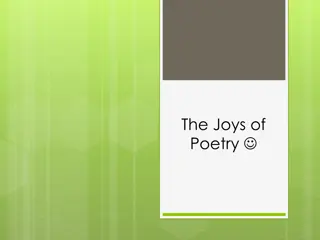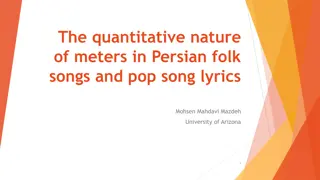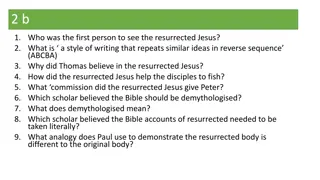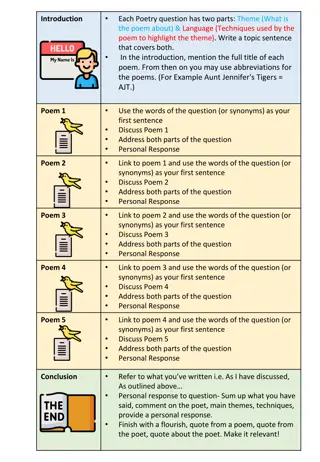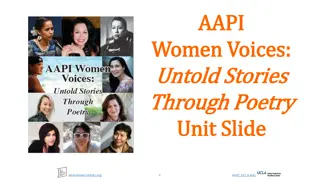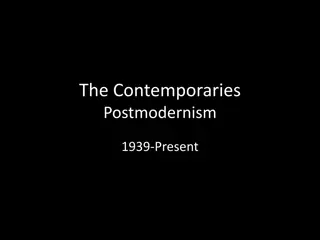Themes in Christina Rossetti's Poetry: Critiques and Interpretations
Critics analyze Christina Rossetti's poems through various lenses, exploring themes of morality, temptation, sexuality, and feminist perspectives. They delve into the complexities of her work, uncovering layers of meaning and subtext that challenge traditional interpretations.
Download Presentation

Please find below an Image/Link to download the presentation.
The content on the website is provided AS IS for your information and personal use only. It may not be sold, licensed, or shared on other websites without obtaining consent from the author.If you encounter any issues during the download, it is possible that the publisher has removed the file from their server.
You are allowed to download the files provided on this website for personal or commercial use, subject to the condition that they are used lawfully. All files are the property of their respective owners.
The content on the website is provided AS IS for your information and personal use only. It may not be sold, licensed, or shared on other websites without obtaining consent from the author.
E N D
Presentation Transcript
Rossetti Critics Rossetti Critics
John John Bayley Bayley Christina Rossetti is, on the face of it, even less likely than Wilde to approve without strong qualification characters who are drawn to the dark side. Most of her poems are powerfully moral in their effect, advising us in orthodox, even puritanical terms that the wages of sin is death, and that eating forbidden fruit cannot easily be put right. In Good Friday her character stands guiltily under Christ s cross, begging Him for forgiveness. This poem says nothing at all about the possible attractions of forbidden pleasures, merely the importance of rejecting them. Yet in her most famous and surprising poem, Goblin Market , the effect is different, partly because it is not Christ but an apparently ordinary Victorian woman who brings salvation to her friend who has eaten the forbidden fruit; and she brings it not by avoiding the fruit-juice, but by letting the goblins smear it across her clenched teeth, and ultimately, it seems, drinking it. In this poem Rossetti does not write about the religious life as one of resistance, avoidance, and vigil, but of commitment to what John Bayley has called the gluttonously intense drama of the forbidden fruit.
Germaine Greer Germaine Greer Rossetti may, therefore, have had good reasons to write a poem about sexuality and addiction (among other things) although her own life was so pious and free from temptation that she refused to tread on pieces of paper in case a sacred name was written on them. Her poem is so full of sub-text that some critics, like Germaine Greer, have argued it has no one meaning, reading it as an allegory with several layers, so it can be read as a view of, for example, Victorian advertising, sex, alcoholism and the lack of freedom for women in marriage.
John John Bayley Bayley Rossetti has a great delight in secrets too,146 and not just in what modern feminist critics tend to call her Signature Poem , the light and playful Winter, My Secret . Some of her poems that seem to deal with the greatest pleasure, like the pleasurable pain of Echo , are so secretive as to their subject that they have no context at all. It is as if the lover (if it is a lover) were concentrating only on the state of absence - or on what John Bayley has called missingness . Explanations as to whether the poem is based on forbidden pleasures or not are perhaps best left to biographers (who have indeed nevertheless often been unable to provide them).
Sandra Gilbert and Susan Sandra Gilbert and Susan Gilbar Gilbar In their 1979 feminist study of nineteenth century women's literature, The Madwoman in the Attic, Sandra Gilbert and Susan Gilbar recognise the factors that prevented a Victorian woman from standing on equal terms to their male contemporaries. They suggest that Rossetti is among the singers of renunciation' of her time and argue that she willingly accepts the state of destitution into which she is cast (p.564). They emphasise how the culture of patriarchy curbed her passions and meant that she was not the powerful female role model that she had the potential to become.
Feminist theology Feminist theology - - Lynda Palazzo Lynda Palazzo Feminist theology is a practice that has become popular in the study of various religions. It seeks to reconsider the sources and literature of a religion from a feminist perspective. In her 2002 book, Christina Rossetti's Feminist Theology, Lynda Palazzo suggests reading and revaluing Rossetti's writings as theology. As such, she argues her poems and devotional prose can be interpreted as interpretations of the Bible. In her consideration of Goblin Market (see Poems for study > Goblin Market), Palazzo writes of how Rossetti has radically rewritten the Fall of Eve in terms of the social and spiritual abuse of women which she sees around her and includes more than a hint that male gender oppression be interpreted as original sin. (p. 27)
SOURCE: "Miss Rossetti's Poems," in SOURCE: "Miss Rossetti's Poems," in Littell's Age, Age, Vol. XC, No. 20, August 18, 1866, pp. 441 Vol. XC, No. 20, August 18, 1866, pp. 441- -42. Littell's Living Living 42. Miss Rossetti, though never excited, is always natural.
Constance W. Constance W. Hassett Hassett Her laconic style is the result of a deeply private dialectic between verbal evasion and aesthetic control. The paradox of Rossetti's art is that the withholding of speech is constitutive. Laconic terse; short
Simon Avery The Victorian period witnessed massive changes in thinking about women s roles in society with much debate concerning women s education, employment opportunities, marriage, sexuality, psychology, and the right to vote. Within this context, Christina Rossetti had complicated views on female suffrage and equality. At times she used the Biblical idea of woman s subordination to man as reason for maintaining the status quo, while at others she argued for female representation in Parliament and spoke out against the sexual exploitation of women in prostitution. In many ways this shows her to be a particularly complex thinker about the position of women in society and it is certainly a concern which she comes back to time and again in her poetry. Her views may not always be radical as such, but they are usually far from conservative and often questioning, challenging and potentially subversive.
Avery Avery Oppression & Alienation Oppression & Alienation The oppression and alienation which many Victorian women might have experienced due to their exclusion from key systems of power is felt strongly in Rossetti s four-stanza poem, From the Antique . Composed in 1854 but never published in Rossetti s lifetime possibly because of its unmistakeable critique the poem opens with an unflinching expression of despair: It s a weary life, it is; she said: Doubly blank in a woman s lot: I wish and I wish I were a man; Or, better than any being, were not: (ll.1-4) These initial lines, with their austere word choice, are uncompromising in their analysis of woman s place in society. The metrical change at the beginning of the second line places an increased emphasis on Doubly blank , while the sense of longing and despondency is caught in the repetitions. Far better to be a man, the speaker suggests, before the surprise turn proposes the desire for extinction altogether. So weary[ing] is the position of women that annihilation is preferable, since this would enable escape from gender expectations and imposed identities. While the world would wag [carry] on the same (l.9), seemingly indifferent to women s plight, the speaker would have removed herself from the endless cycle of bleak conformity where individuals wake and weary and fall asleep (l.16).
Avery Avery Marriage and the complexities of Marriage and the complexities of relationships relationships In the ballad-like poem Maude Clare , which was written in 1857-58 and published in Goblin Market and Other Poems in 1862, this examination takes place just after the wedding service itself. The church here becomes the site of conflict as the newly-wed Thomas and Nell are intruded upon by Maude Clare, Thomas s previous lover. Throughout the poem, Nell and Maude Clare are set up as opposites His bride was like a village maid,/ Maude Clare was like a queen, we are told in the first stanza (ll.3-4) and it is increasingly Maude Clare, rather than the new bride, who is the focus of attention. Indeed, in a poem which is composed principally of dialogue, Maude Clare dominates the meeting as she returns to Thomas the gifts that he has previously given her ( half of the golden chain/ You wore about your neck , ll.21-22) and then offers Nell her share of a fickle heart (l.37) a neat reversal of the friendship and community traditionally associated with the wedding gift.
Avery Avery Marriage and the complexities of Marriage and the complexities of relationships relationships Maude Clare Maude Clare In the ballad-like poem Maude Clare , which was written in 1857-58 and published in Goblin Market and Other Poems in 1862, this examination takes place just after the wedding service itself. The church here becomes the site of conflict as the newly-wed Thomas and Nell are intruded upon by Maude Clare, Thomas s previous lover. Throughout the poem, Nell and Maude Clare are set up as opposites His bride was like a village maid,/ Maude Clare was like a queen, we are told in the first stanza (ll.3-4) and it is increasingly Maude Clare, rather than the new bride, who is the focus of attention. Indeed, in a poem which is composed principally of dialogue, Maude Clare dominates the meeting as she returns to Thomas the gifts that he has previously given her ( half of the golden chain/ You wore about your neck , ll.21-22) and then offers Nell her share of a fickle heart (l.37) a neat reversal of the friendship and community traditionally associated with the wedding gift. Thomas remains significantly silent throughout, hiding his face and barely able to stutter Maude Clare s name a clear critique of dominant masculinity and it is interestingly left to Nell to confront the intruder. For in the poem s final two stanzas, it is Nell who takes over the speaking voice, directly addressing Maude Clare and asserting, in a phrasing which rings out a challenge, that she will take what Maude Clare spurns: Yea, tho you re taller by the head, More wise, and much more fair; I ll love him till he loves me best, Me best of all, Maude Clare. (ll.45-48) Here, Nell both subtly wrestles power back from the ex-lover and asserts her centrality in relation to her husband. Maude Clare might have dominated the scene throughout, yet it is Nell s determination and defiance which strike home at the end.
Avery Avery Marriage and the complexities of Marriage and the complexities of relationships relationships No, Thank You, John No, Thank You, John This idea of a woman s choice and determination in relationships can also be felt in the humorous but forceful No, Thank You, John (written 1860; published 1862). Here the speaker is in no doubt about her mind as she firmly rejects a potential suitor in whom she has no interest. From start to finish, she resists John s entreaties (we hear some of his comments through reported speech) as she deploys impeccable logic and effectively turns his own arguments against him: I never said I loved you, John: Why will you teaze me day by day, And wax a weariness to think upon With always do and pray ? [ .] I have no heart? Perhaps I have not; But then you re mad to take offence That I don t give you what I have not got: Use your own common sense. (ll.1-4; 13-16) What this poem asserts is the woman s right to say no and to claim independence and agency for herself. Certainly, she is not to be bullied into a relationship because a man or social convention more generally demands it.
Avery Avery - - Manipulating power Manipulating power The astonishing Winter: My Secret , written in 1857 and published in 1862, illustrates another way in which the speakers of Rossetti s poems establish strategies for defying expectations and conventions. As William Michael Rossetti noted, this poem was originally called Nonsense , a title which gestures towards the text s playful nature. With its bounding rhythms, skilful word play, and building up of image on image, the poem is teasing and mischievous as the speaker refuses to share a secret that she knows: I tell my secret? No indeed, not I: Perhaps some day, who knows? But not today; it froze, and blows, and snows, And you re too curious: fie! You want to hear it? well:Only, my secret s mine, and I won t tell. (ll.1-6) Behind this playfulness, however, is an intriguing study in the manipulation of power. For the speaker denies entry to the reader I cannot ope [open] to every one who taps (l.13) and instead metaphorically wraps herself in protective clothing ( a shawl,/ A veil, a cloak , ll.11-12) which will keep others out. Her privacy is not to be intruded upon and she consequently leaves the reader guessing at her knowledge, even suggesting that there might not be a secret after all, only just my fun (l.9). This therefore becomes an intriguing poem about what is not said, where the speaker skilfully withholds power and control. The game is hers and she will only tell when and if she chooses. In poems such as these, then, Rossetti s speakers demonstrate both an awareness of, and resistance to, those social and political expectations which define acceptable roles for women and which potentially leave them powerless. While poems such as From the Antique and In an Artist s Studio emphasise the ways in which women might be trapped by convention, other poems such as Maude Clare , No, Thank You, John , and Winter: My Secret reveal a much more complex negotiation of power which enables the women to achieve agency, equality and self- sufficiency. As such, Rossetti s poems make an intriguing contribution to those crucial debates around the Woman Question and gender relations which were central to the second half of the nineteenth century and beyond.
Conflict between earthly desire and heavenly Conflict between earthly desire and heavenly devotion devotion Symons * suggests that this struggle was vital for the depth and power of her poetry as it was written on a dark background of gloom caused by her mixed feelings thus considers it biographical. *AND recurring theme of constant struggle in order to overcome temptation self- repressed passion has a lasting effect on her. Harrison *argues this perspective was merely in order to craft her poetry as an art form. *AND passions for God and man mirror each other as they are both intense and required suffering. Conflict also extends to the beauty of nature vs the beauty of what is to come in heaven. Ball *not necessarily biographical, but linked to the values of the Victorian age women s true desires and feelings not appropriate to be shared and have to demonstrate virtue and chastity, while sharing feels of lust and sexual desire with men.
Devotion and Faith Devotion and Faith Symons explores morality in her poems and the depth of her own faith, but never preaches and tells us directly to reform our characters. AND obsession with the idea of death and the temporary nature of human existence led to focus on attaining immortality through salvation. Palazzo uses reinterpretation of Biblical stories to support her opinions about women. Goblin Market presented as a retelling of the fall of Eve, so that we have sympathy with her and do not condemn her in the face of male oppression from the goblins. Harrison early poetry mainly about dedication to art and expression rather than religion. Religion always important, but as a way to explore emotions and feelings poetry dries up when she becomes more committed to her faith as she ages. AND seems to treat women in a divine manner as even fallen women like Maude Clare are made to stand above their male peers.
Lack of Self Lack of Self- -Worth Worth Symons writing comes from the perspective of dark gloom in her life. Does not write from a position of hope, but rather of despair and necessary renunciation. Harrison uses intertextual reference to express more complex ideas for fear of public perception should she boldly state her perspective. HOWEVER, in life demonstrated a steely confidence in her work and did not only value being published, but did value literary criticism or input. AND not a case of self-doubt, but rather she values humility, fidelity and courage, which often in the face of religious belief can be presented as lacking self-worth, but is really deferential. Ball not necessarily biographical, but linked to the values of the Victorian age women s true desires and feelings not appropriate to be shared and have to demonstrate virtue and chastity, while sharing feels of lust and sexual desire with men.
Gender Gender the Role of Women the Role of Women Gilbert and Gilbar renunciation in her life and poetry partly related to her existence in a patriarchal society where women were not expected to have these desires. AND would have been more of an impact as a supporter of women s rights if the world had not been so male dominated and also religion confined women to a supporting role. Palazzo uses reinterpretation of Biblical stories to support her opinions about women. Goblin Market presented as a retelling of the fall of Eve, so that we have sympathy with her and do not condemn her in the face of male oppression from the goblins. Harrison seems to treat women in a divine manner as even fallen women like Maude Clare are made to stand above their male peers. William Michael Rossetti work all from a religious perspective and ideas about temptation are artistic rather than true self searching or expression of appropriateness for women.
Rossetti Critics Websites Rossetti Critics Websites http://crossref-it.info/textguide/Christina-Rossetti,-selected- poems/28/1899 http://www.literaryhistory.com/19thC/ROSSETTIC.htm https://www.bl.uk/romantics-and-victorians/articles/christina- rossetti-gender-and-power http://www.cieliterature.com/opinions-literary-criticism-of-rossetti/ Harrisson: http://www.victorianweb.org/authors/crossetti/harrison2/1.html
